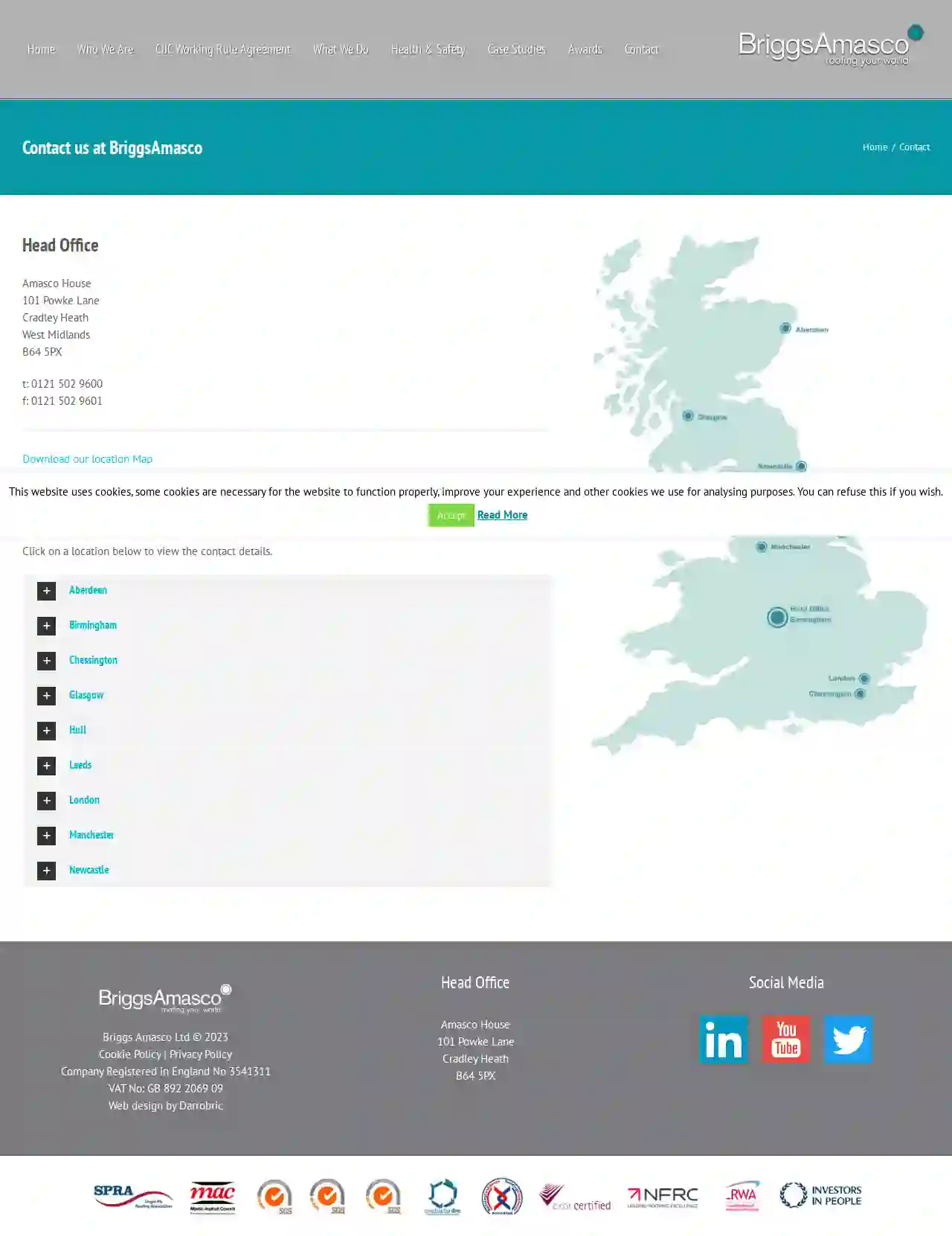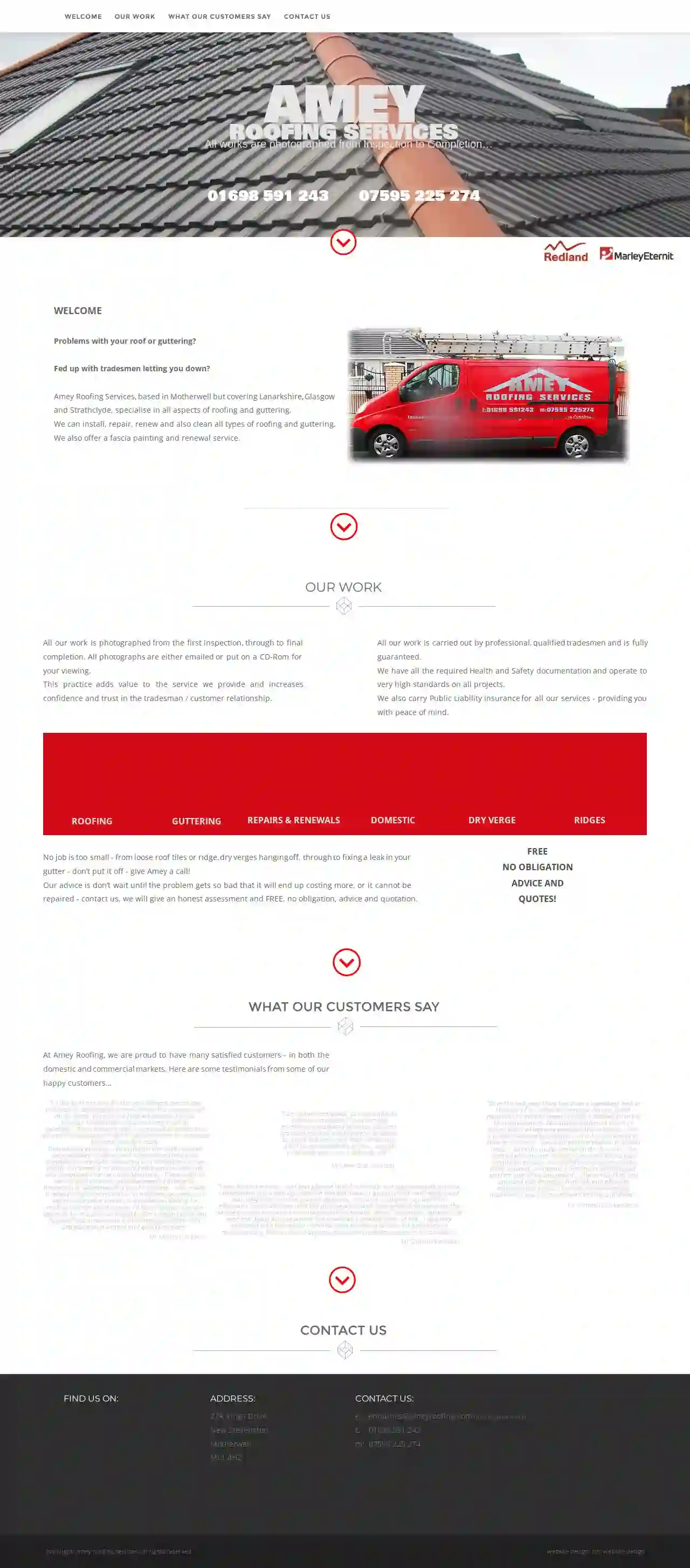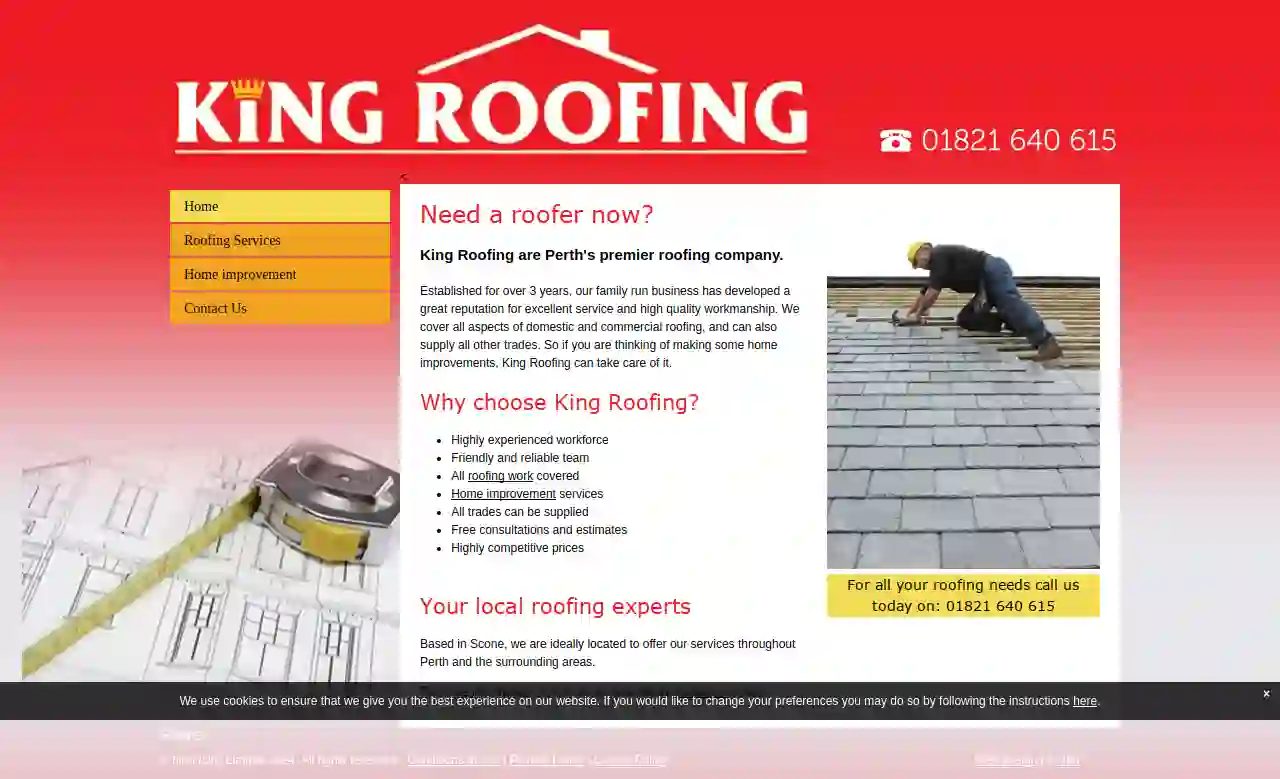Roofing Companies Tillicoultry
Find top Roofing Service in Tillicoultry
Receive multiple Roofing Service quotes for your project today! Compare profiles, reviews, accreditations, portfolio, etc... and choose the best service.

Oasis property maintenance
4.516 reviewsPerth, GBOasis Property Maintenance is your local, one-stop property improvements company that is passionate about transforming your property into your very own oasis. From external painting & roofing repairs to groundworks and joinery services, the Oasis team has all your property improvement needs covered. Our team has quickly established a great reputation for delivering both exceptionally high standards of workmanship and also outstanding levels of customer service. We’re proud to offer our specialist services throughout Scotland, including Perth, Dundee, Fife & the Highlands. why choose Oasis property maintenace EXPERIENCED Our highly skilled team has over 25 years experience in delivering a high-quality property maintenance service – you can be assured your home is in the very best hands PROFESSIONAL From start to finish, we pride ourselves on delivering a high quality, friendly & professional service to all of our customers – our reviews speak for themselves RELIABLE Our team are committed to achieving a high level of customer satisfaction and an exceptional standard of workmanship on every project we undertake
- Services
- Why Us?
- Testimonials
- Gallery
Get Quote
PROTECT Roofing& roughcast specialists
517 reviewsLeving Place, Livingston, GBWelcome to PRO-TECT Roofing Looking for a roof repair or new roof? PRO-TECT Roofing are specialists in slating and tiling homes or commercial buildings. Our team can do a thorough job of making sure that your roofing requirements are exactly met with a eye for attention to detail our aim is 100% customer satisfaction and we won't settle for nothing less. Get complete peace of mind knowing our work is guaranteed and we are full liability insured so you know your property is in safe hands.
- Services
- Why Us?
- Testimonials
- Gallery
Get Quote
Dunfermline Roof Maintenance
54 reviewsBoreland Rd, Kirkcaldy, KY2 6JL, GBFife Roof is a family-run company committed to customer care and ensuring our services are delivered to the very highest standard. With over 30 years of experience in roofing repairs and installation, we offer a wealth of services including flat roofing, tiled roofing, slate roofing, and roofline repairs. We are proud of our reputation for quality and welcome enquiries from all customers, no matter what the size of the job or where you are in the region. We are a long-established company providing affordable services to many customers across Fife.
- Services
- Why Us?
- Gallery
Get Quote
Briggs Amasco
4.45 reviews101 Powke Lane, Amasco House, Cradley Heath, B64 5PX, GBBriggsAmasco is UK's leading national commercial roofing company. Roofing your World Since 1865. Our Mission is to carry out Roofing and Waterproofing contracts, using the best and technically most appropriate products in order to give our customers the best value in accordance with their budgetary and performance requirements.
- Services
- Why Us?
- Accreditations
- Our Team
- Testimonials
- Gallery
Get Quote
Armour Roofing and Slating Ltd.
59 reviews34 Hawksmuir, Kirkcaldy, KY1 2PW, GBWelcome to Armour Roofing and Slating Services Ltd, your trusted roofing company in Fife. With over 21 years of expertise, we are fully SVQ Qualified, Trained Roofing Contractors specialising in Roofing, Slating, Tiling, Firestone Rubber Cover & Felt Roofing. Our commitment is to provide high-quality roofing solutions with a hands-on approach, ensuring that every project meets the highest of standards. If you’re in need of reliable Roofers in Fife, or comprehensive Roofing Services, look no further. From emergency roof repairs to complete new roof installations, Armour Roofing and Slating is your trusted partner. Based in Kirkcaldy, we’ve built a strong reputation, proudly serving an expanding customer base across Fife, including areas like Kirkcaldy, Dunfermline, Glenrothes, St. Andrews, Cupar, Leven, Anstruther etc. At Armour Roofing and Slating, customer satisfaction is our top priority. Our dedicated team of roofing experts, specialising in Slate Roofing, Tiling, Rubber Roofing & Felt Roofing, is dedicated to meeting your needs. Discover why a significant portion of our business comes from satisfied customers and word-of-mouth referrals. Explore our services and contact us for all your roofing needs.
- Services
- Why Us?
- Our Team
- Testimonials
- Gallery
Get Quote
RPS Roofing & Building LTD
4.813 reviewsDunfermline, GBRPS Roofing & Building is a team of highly trained and qualified roofers based in Dunfermline, Scotland. We are Scotland’s premier listed and conservation property specialists, offering a wide range of roofing and building services throughout Scotland. No job is too big or too small for our team, and we pride ourselves on providing 100% customer satisfaction. We offer free quotations and 24-hour emergency call-out services. All our repair work is guaranteed for up to 5 years, and new roof installations are guaranteed for 20 years.
- Services
- Why Us?
- Testimonials
- Gallery
Get Quote
AMEYROOFING SERVICES
51 reviews27A Kings Drive, New Stevenston, ML1 4HZ, GBAmey Roofing Services is a family-run business based in Motherwell, serving Lanarkshire, Glasgow, and Strathclyde. We specialize in all aspects of roofing and guttering, including installation, repair, renewal, and cleaning. Our services also encompass fascia painting and renewal. We pride ourselves on our commitment to providing high-quality workmanship and excellent customer service. We are fully insured and operate to very high standards, ensuring your peace of mind. We offer a free, no-obligation advice and quotation service.
- Services
- Why Us?
- Our Team
- Testimonials
- Gallery
Get Quote
King Roofing
51 reviews124 Perth Rd, Perth, PH2 6JE, GBKing Roofing are Perth's premier roofing company. Established for over 3 years, our family run business has developed a great reputation for excellent service and high quality workmanship. We cover all aspects of domestic and commercial roofing, and can also supply all other trades. So if you are thinking of making some home improvements, King Roofing can take care of it. Based in Scone, we are ideally located to offer our services throughout Perth and the surrounding areas.
- Services
- Why Us?
- Gallery
Get Quote
Taylor Roofs - Roofing Repair & Replacement Services
5145 reviewsUnit 5, Standhill Industrial Park, Whitburn Road, Bathgate, EH48 2XJ, GBJ Taylor Roofing Services Ltd is a family-run business based in Bathgate, West Lothian. We have over 20 years of experience in the roofing industry and pride ourselves on providing a high-quality, reliable service to our customers. We offer a wide range of roofing services, including roof repairs, roof replacements, flat roofing, roofline & roughcasting, and roofing service contracts. We are fully insured and accredited by the National Federation of Roofing Contractors (NFRC).
- Services
- Why Us?
- Accreditations
- Our Team
- Testimonials
- Gallery
Get Quote
Dalgrain Roofing & Building Ltd
GBLanarkshire Roofing Network is a network of trusted roofing professionals serving Lanarkshire and surrounding areas. We offer a comprehensive range of roofing services for both domestic and commercial properties, including roof repairs, flat roofing, pitched roofing, fascias and soffits, and more. Our experienced and qualified members are dedicated to providing high-quality workmanship and exceptional customer service. We understand the importance of a well-built roof and strive to ensure that every project is completed to the highest standards. Whether you need a small repair or a complete roof replacement, Lanarkshire Roofing Network is here to help.
- Services
- Why Us?
- Gallery
Get Quote
Over 12,314+ Roofers registered
Our roofing pros operate in Tillicoultry and beyond!
Roofyng.co.uk has curated and vetted Top Roofing Businesses arround Tillicoultry. Find a top & reliable business today.
Frequently Asked Questions About Roofing Companies
- Listed Buildings: Buildings with historical or architectural significance.
- Conservation Areas: Areas with special architectural or historical character.
- Changes to Roof Design: If you're making significant alterations to the roof's design, such as adding a dormer window or changing the pitch.
- Clear the Area: Remove any vehicles, outdoor furniture, or other items from around your house to provide the roofing crew with easy access.
- Protect Landscaping: Cover plants, shrubs, and other landscaping elements near the house with tarps or plastic sheeting to protect them from falling debris.
- Clear the Attic: Remove or cover items stored in your attic, as dust and debris might fall through during the removal of the old roof.
- Notify Neighbors: It's courteous to inform your neighbors about the upcoming roof replacement project, especially if it's likely to be noisy or disruptive.
- Discuss Logistics with the Contractor: Coordinate with the roofing contractor regarding access to your property, parking arrangements, and any special instructions or concerns you have.
- Choose Reflective Roofing Materials: Opt for light-colored shingles or metal roofing that reflects sunlight and reduces heat absorption.
- Install Proper Attic Insulation: Adequate insulation prevents heat loss in the winter and heat gain in the summer.
- Ensure Adequate Ventilation: Proper attic ventilation allows hot air to escape, reducing cooling costs and extending the lifespan of your roof.
- Consider a Radiant Barrier: In hot climates, a radiant barrier installed in the attic can reflect heat away from the roof, further reducing cooling needs.
Do I need planning permission to replace my roof in the UK?
How do I prepare for a roof replacement?
How often should I clean my gutters?
How can I make my new roof more energy-efficient?
Do I need planning permission to replace my roof in the UK?
- Listed Buildings: Buildings with historical or architectural significance.
- Conservation Areas: Areas with special architectural or historical character.
- Changes to Roof Design: If you're making significant alterations to the roof's design, such as adding a dormer window or changing the pitch.
How do I prepare for a roof replacement?
- Clear the Area: Remove any vehicles, outdoor furniture, or other items from around your house to provide the roofing crew with easy access.
- Protect Landscaping: Cover plants, shrubs, and other landscaping elements near the house with tarps or plastic sheeting to protect them from falling debris.
- Clear the Attic: Remove or cover items stored in your attic, as dust and debris might fall through during the removal of the old roof.
- Notify Neighbors: It's courteous to inform your neighbors about the upcoming roof replacement project, especially if it's likely to be noisy or disruptive.
- Discuss Logistics with the Contractor: Coordinate with the roofing contractor regarding access to your property, parking arrangements, and any special instructions or concerns you have.
How often should I clean my gutters?
How can I make my new roof more energy-efficient?
- Choose Reflective Roofing Materials: Opt for light-colored shingles or metal roofing that reflects sunlight and reduces heat absorption.
- Install Proper Attic Insulation: Adequate insulation prevents heat loss in the winter and heat gain in the summer.
- Ensure Adequate Ventilation: Proper attic ventilation allows hot air to escape, reducing cooling costs and extending the lifespan of your roof.
- Consider a Radiant Barrier: In hot climates, a radiant barrier installed in the attic can reflect heat away from the roof, further reducing cooling needs.